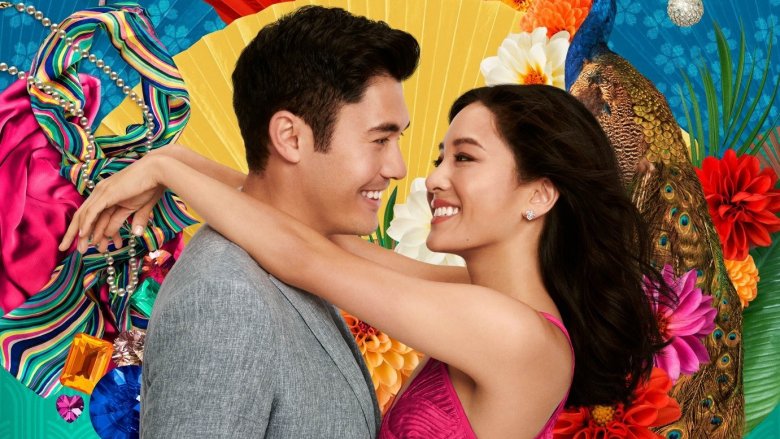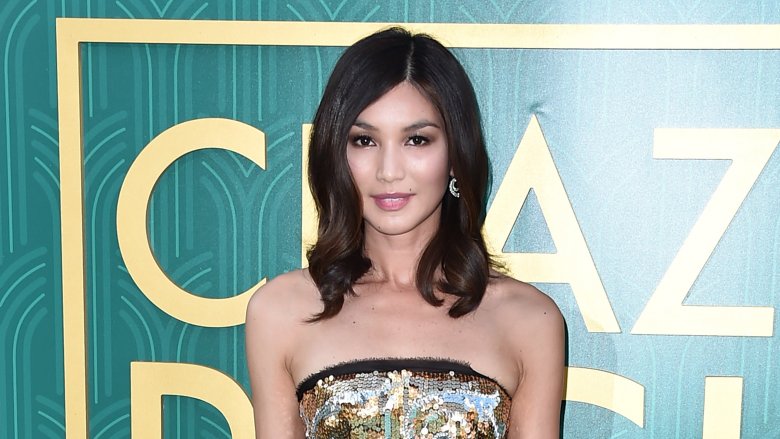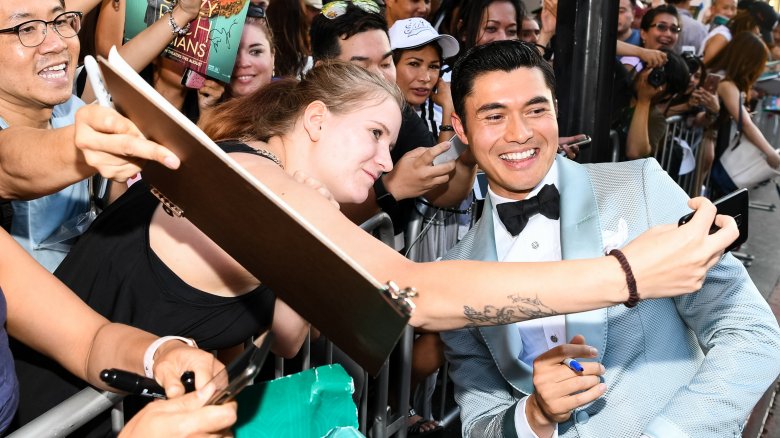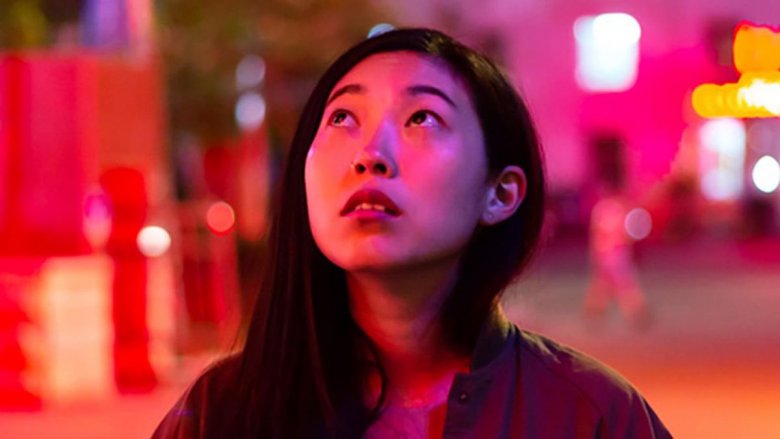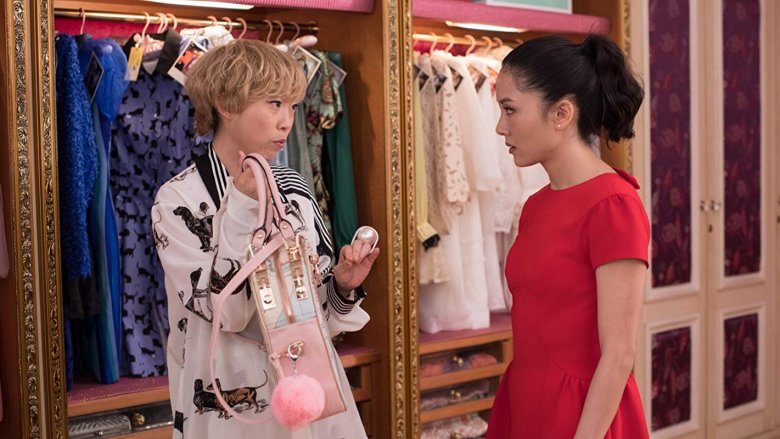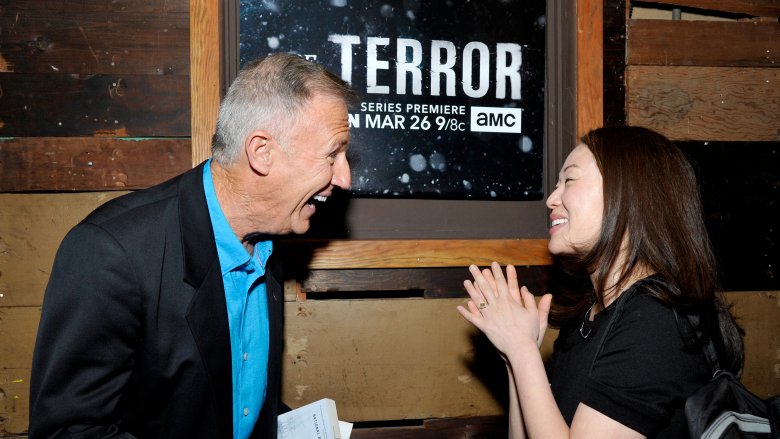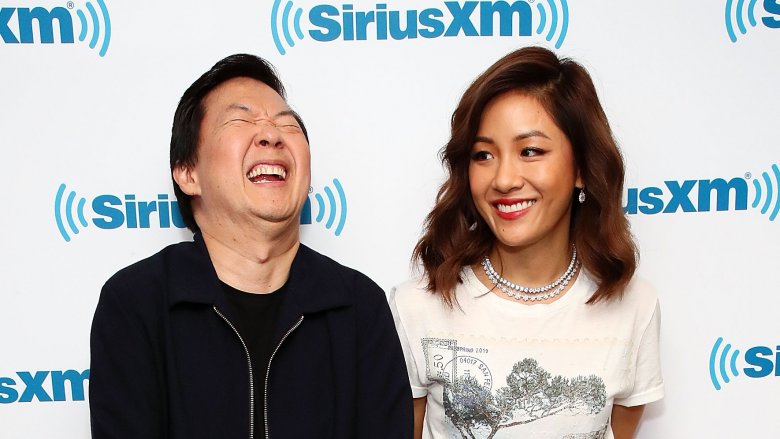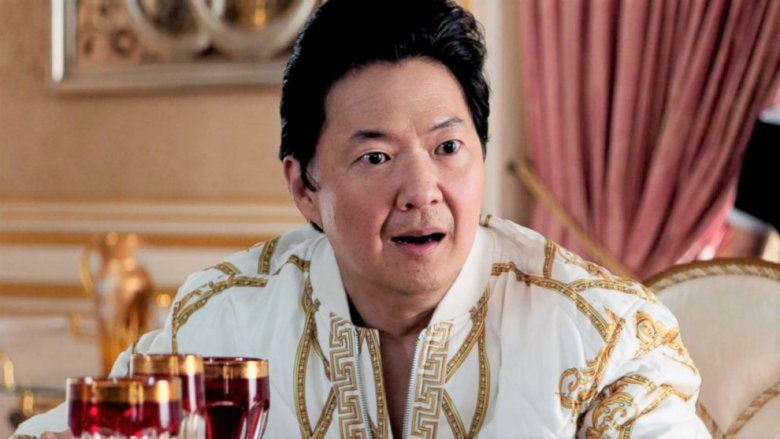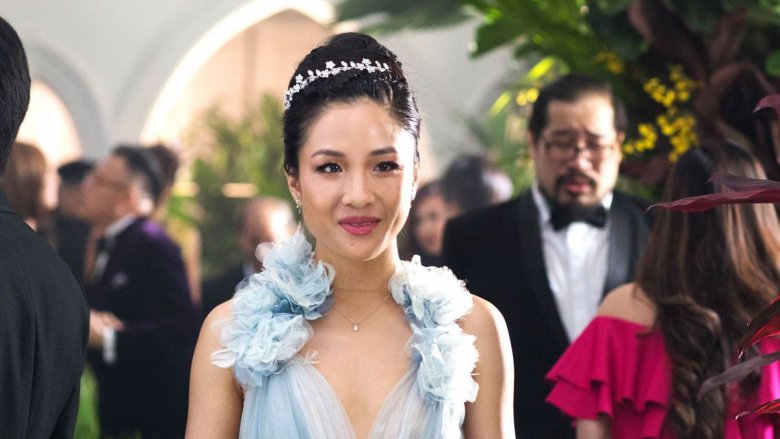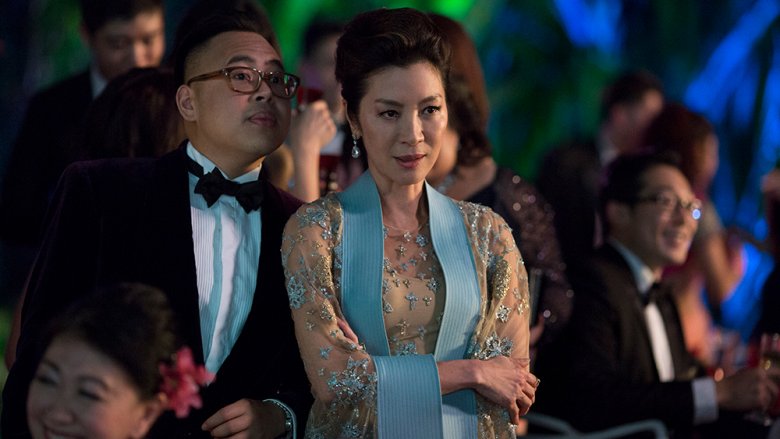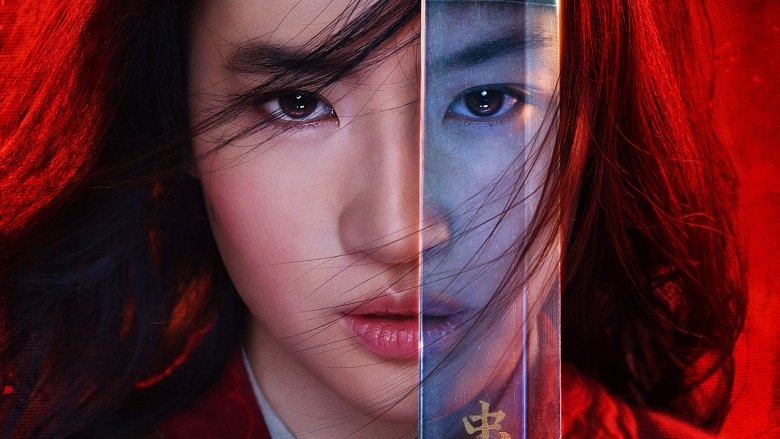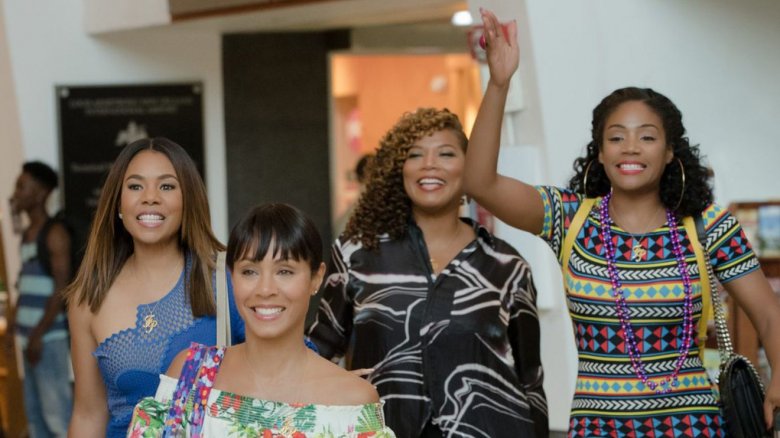How Crazy Rich Asians Changed Hollywood And No One Noticed
August 2018 was a huge month for Asian representation in Hollywood. John Cho-led thriller Searching turned out to be a critical and commercial success for Sony, while Netflix film To All the Boys I've Loved Before (starring Vietnamese-American actress Lana Condor in her first lead role) was dubbed "the best of the platform's romantic comedy slate and a full-on cultural phenomenon" by The A.V. Club. Both titles played a massive part in what would become known as "Asian August" on social media, but the film that really changed the game was Crazy Rich Asians.
Released theatrically on August 15, the Singapore-set rom-com defied all expectations, wowing critics (it holds an impressive 91 percent rating on Rotten Tomatoes) and pulling in just shy of $240 million at the worldwide box office. "I think this is the start of a new movement," director Jon M. Chu told Reuters at the time. "The audience needs to decide. If they show up on opening weekend, that sends a very clear message to the studios that more will be made. They are sitting at their desks right now with movies that have not been greenlit." The figures speak for themselves, but did the movement that Chu predicted actually happen? A year has passed since Crazy Rich Asians blew up, and one thing's for certain — it changed Hollywood.
It gave Asian actors 'a seat at the table'
British-Asian actress Gemma Chan plays Singaporean socialite Astrid Leong in Crazy Rich Asians, one of the five protagonists in the Kevin Kwan novel upon which the film is based. Growing up in the United Kingdom, Chan had limited chances to prove herself. "When I left drama school, I was told by the voice teacher, 'Be prepared that you are going to really struggle, most of the output from the UK is period drama and you won't get a look-in,'" Chan told Vogue. "And for the first few years that really was the case. I didn't even get a chance to audition."
She eventually landed a role on the critically acclaimed British sci-fi series Humans, her launching-pad to Hollywood. In 2019, she appeared alongside Brie Larson in the MCU movie Captain Marvel, but Crazy Rich Asians was a far more pivotal moment for her, and for Asian actors in general. "I'm really happy that things seem to be shifting, and it feels like it's not just a trend; it feels like we're here to stay," she told Deadline. "I think all that anyone wants is equal opportunity and a seat at the table, and I feel that we're finally getting to that point. There's still work to be done. But yeah, I just feel really, very proud, very grateful to be part of this change."
It made Asian men sexy
Traditionally, the kind of parts offered to Asian actors have been largely stereotypical. "The roles weren't super offensive," Fresh Off the Boat star Randall Park said (via Time). "But when you look back and realize how many doctors you play, you think, okay, that's how they see us." But according to Asian-American actress Maya Erskine (star and co-creator of the Hulu series PEN15), Crazy Rich Asians "100 percent" changed Hollywood, especially the way Asian men are depicted on-screen. After all, the leading man in Crazy Rich Asians (Henry Golding's Nick Young) is a history professor, but he's not your typical Asian intellectual.
"It was really exciting for me to see Asian men on-screen in the most beautiful way," Erskine told InStyle. "In America, I don't think I can name a movie where you're seeing Asian men sexually, honestly, and in a way that's like, 'Wow, that guy is so hot, and he's leading this movie.' In that way, it was a really emotional experience to watch." This sentiment was echoed by Henry Golding's co-star Constance Wu (Rachel Chu) when she told Variety that she loves that "we have sexy Asian leading men." And really, Crazy Rich Asians has a whole lot to do with that.
It opened new doors for Asian-American actors
Rapper-turned-actress Awkwafina plays Goh Peik Lin in Crazy Rich Asians, a wealthy Singaporean and college friend of Constance Wu's fish-out-of-water Rachel Chu. Awkwafina gained online notoriety with her music before transitioning to mainstream movies with a supporting role in 2016's Neighbors 2: Sorority Rising. The Asian-American performer (real name Nora Lum) later appeared in 2018's Ocean's 8, but it was Crazy Rich Asians that turned her into a star.
"I thought that I had a good fan base, and then Crazy Rich Asians came out, and I was like, 'Oh, okay!'" she told comedian and actress Margaret Cho for Harper's Bazaar. "After Crazy Rich Asians, people would come up to me crying — it was almost a bittersweet joy for them seeing a movie like that and realizing how important representation is. Asian-American actors have told me that before Crazy Rich Asians they couldn't get one audition. Now they're getting tons. It helped open the door for movies like The Farewell."
The Farewell — in which Awkwafina (the daughter of a South Korean immigrant mother and a Chinese-American father) appears in her first dramatic role — was the film everyone was talking about at Sundance 2019. At the time of writing, the film has an incredible 99 percent rating from 180 reviews on Rotten Tomatoes. Awkwafina's performance is potentially Oscar-worthy, and it was Crazy Rich Asians that really helped her catch Hollywood's attention.
It helped reduce the 'inherent bias' in Hollywood
The last Hollywood movie with an all-Asian cast was 1993's The Joy Luck Club, a drama about the relationships between four Chinese-American women and their immigrant mothers. The fact that it took 25 years for another all-Asian movie to be made must mean that The Joy Luck Club was a failure, right? In fact, that couldn't be further from the truth. "One of the most touching and moving of the year's films," said veteran film reviewer Roger Ebert, just one of the many critics who loved the movie. The film boasts an 86 percent rating on Rotten Tomatoes, and it was the 48th highest-grossing movie of 1993. If The Joy Luck Club was so well received, then how come it took nearly three decades for something like Crazy Rich Asians to be made?
Asian-American screenwriter Diana Son (13 Reasons Why) believes that Hollywood failed to act because of an "inherent bias" in the industry, dismissing The Joy Luck Club as a one-off. "It's not that The Joy Luck Club failed to inspire Asian-American writers and directors to try to sell their stories, what it failed to produce was more financing opportunity," Son told InStyle. "That just comes down to, were the people who were making decisions about what TV shows and movies get made, were they interested in our stories? And I think the answer was no." That certainly isn't the case now, as a sequel to Crazy Rich Asians is already on the way.
Crazy Rich Asians made producers sit up and take notice
The success of Crazy Rich Asians (it quickly became the highest-grossing rom-com in a decade), coupled with the fact that there's more source material to draw from (there are three books in total), meant a sequel was inevitable, but the movie has also helped other Asian filmmakers get their projects off the ground. Writer-producer Soo Hugh (The Terror) didn't have high hopes when she decided to shop an adaptation of Min Jin Lee's best-selling novel Pachinko around Hollywood, but to her surprise, the property sparked a bidding war.
"I was shocked by the way the people reacted to this show in the marketplace," Hugh said (via Time). "It was that cynicism that these doors were closed to me." Of course, there's a chance that somebody would've taken her up on her offer regardless, but the fact that Crazy Rich Asians was causing some major buzz at the time seemed to help her cause. "I would be naive to say that it wasn't a factor," she told InStyle. "It very much helped grease the way, if that makes sense. It made it a little easier."
According to The Hollywood Reporter, Hugh signed a two-year deal with Media Res, with the company making "a sizable script-to-series commitment." She will serve as showrunner on Pachinko, the intergenerational story of a Korean immigrant family. The show has been allocated a "budget akin to Netflix's The Crown," THR confirmed.
The movie created some 'momentum'
If there's one word that's been used repeatedly since Crazy Rich Asians dropped in August 2018, it's momentum. Ken Jeong (Goh Wye Mun) pointed out that ABC's Asian-centric sitcom Fresh Off the Boat (which stars Crazy Rich Asian's Constance Wu) deserves some credit for laying the groundwork, but it was Jon M. Chu's rom-com that really got the ball rolling. According to Mariko Carpenter (vice president of strategic community alliances at Nielsen), Crazy Rich Asians "showed that [Asian-American consumers] have the influence and the reach to make a difference" when it comes to swaying the studios.
"Young people are seeing the world through a diverse lens so they're expecting that in the media that they support," Carpenter told InStyle. "We see data that brands and companies that are embracing diversity are the ones winning, the ones seeing growth, and it really comes from the desire of the consumer group." Producer Albert Kim (Sleepy Hollow) noticed this shift happening shortly after Crazy Rich Asians premiered. "In the last week, two network pilots were sold that feature all-Asian casts," the producer tweeted on August 17, 2018. "I also know of three cable projects, all in active development, that mostly feature Asian and Asian-American characters. It's going to happen, the momentum is there."
Crazy Rich Asians 'moved the bar'
According to Japanese-American screenwriter Lisa Takeuchi Cullen, Hollywood operated under the belief that Asian leads simply couldn't put bums in seats for years. However, in the post-Crazy Rich Asians Hollywood, she claims that's a thing of the past. "For us, one hurdle — maybe even the tallest hurdle — is getting networks to believe that audiences will show up for these stories, and I think that's where Crazy Rich Asians has moved the bar," she told NBC News. "In Hollywood, numbers speak. And when a movie with all-Asian leads brings up $35 million in the first week, executives sit up and take notice."
Cullen revealed that she'd received a phone call about a potential new project just days after Crazy Rich Asians opened, and she noticed the shift in attitude almost immediately. As she explained, "Usually after they explain the premise is when I jump in and say, 'How would you feel if the leads were people of color?' This time, this producer said, 'The only thing that's non-negotiable is that the lead is Asian-American.'"
At the end of the day, as long as Asian-led projects continue to make cash, networks and studios will keep making them. "Money talks," Crazy Rich Asians star Ken Jeong told BuzzFeed. "So when you are doing big business and we're doing something like Crazy Rich Asians that gets a worldwide box office gross for $230 million, then everybody will want to get in that game."
It showed Hollywood a blueprint for the Asian rom-com
Another person that Crazy Rich Asians has helped out is Lillian Yu, who managed to sell a spec-script to New Line Cinema on the back of the rom-com's roaring box office success. China-born Harvard graduate Yu (a staff writer on NBC's Powerless) was able to cut a deal for Singles Day, based on a huge celebration in China that's essentially the anti-Valentine's day. "The idea is to generate a film in the vein of culturally diverse New Line ensemble romantic comedies that have included He's Just Not That Into You, Valentine's Day, and New Year's Eve," Deadline confirmed.
"I think people were unsure before Crazy Rich Asians came out whether this kind of movie could work, and everyone was really surprised that it did," Yu told NBC News. "It opened a lot of doors for a lot of people, including me." According to Yu's agent Max Michael, Singles Day sold a matter of days after the release of Crazy Rich Asians. "If six months, a year ago, we had taken out the same project, I don't know that we would've had the success that we had with it," Michael added. "I think we got a lot of people on their heels in terms of, 'Maybe this is something that is worth trying. We know how to make this movie now.'"
It helped dispel harmful Asian stereotypes
Ken Jeong has been asked to give his characters a stereotypical Asian accent in the past, despite there being no actual reason for it. He flat-out refuses to go down that route nowadays, and because of Crazy Rich Asians, more Asian-American actors are in a position to do the same. "I was very polite and very calm and I just said, 'As we've said before, you know, I will not do that,'" Jeong recalled during an interview with BuzzFeed. "It's not just me doing that. Every Asian-American actor you know with some visibility has had to say that, and I think that's just getting less with the success of projects like Crazy Rich Asians."
According to Crazy Rich Asians star Michelle Yeoh (Eleanor Young), when she first arrived in Hollywood, the presence of Asian characters always had to be explained. "'Oh, she comes from Chinatown; oh, she's the waitress; oh, she's from the laundromat or the takeout,' or something like this," she told Variety. Yeoh has been in Hollywood for decades (she came to the attention of Western audiences after starring opposite Chow Yun Fat in Ang Lee's wuxia hit, Crouching Tiger, Hidden Dragon), and the actress is amazed that she's only now seeing studios recognize the potential in Asian stories. "At least it's happening so that I can see what we've been fighting for all this time," she told IndieWire.
Crazy Rich Asians created new Hollywood stars
Awkwafina's dramatic turn in Lulu Wang's Sundance standout The Farewell has critics raving (the actress deserves "awards consideration," The New York Times said), but she's not the only Crazy Rich Asians star causing a buzz. The rom-com's male lead Henry Golding had no major acting credits to his name when he was cast as Singapore's most eligible bachelor, Nick Young. He was no stranger to the camera (he'd previously worked as a Malaysia-based presenter on the BBC's Travel Show), but this British-Asian was a million miles away from starring in a Hollywood movie. Fortunately, he sent over an audition tape anyway, and the rest is history.
Things have been moving fast for Golding since Crazy Rich Asians. "I haven't had the moment to settle down and enjoy it," he told the BBC. He played Blake Lively's husband in the critically acclaimed Paul Feig thriller, A Simple Favor. After that came Monsoon, a romantic drama directed by Cambodian filmmaker Hong Khaou, also a hit with critics. Golding has two other projects in the can: Last Christmas, a rom-com co-starring Emilia Clarke, and The Gentlemen, an action flick directed by Guy Ritchie.
There's now an excess of Asian-centric projects in Hollywood
We've already touched on the Awkwafina vehicle The Farewell, the Soo Hugh series Pachinko, and Lillian Yu's Singles Day, but this is just the tip of the iceberg. There's currently numerous Asian-centric projects in various stages of development in Hollywood, a sure sign that Crazy Rich Asians has made a lasting impact on a previously reluctant industry. "For a large part of my career, I've sought out projects that could feature Asian and Asian-American characters," producer Albert Kim told NBC News. "And for the first time, producers are calling me with projects like that. And what's incredible to me is that I actually don't have the time to take on everything, which is great because that means there's more than enough to go around."
Awkwafina is getting a Comedy Central series, and Crazy Rich Asians director Jon M. Chu is developing a project based on the 2018 Thai cave rescue for Netflix. Elsewhere, HBO is working with Diana Son (13 Reasons Why) on a pilot called Slanted, Nina Yang Bongiovi (Dope) is putting together a biopic based on Japanese-American activist Yuri Kochiyama, and fashion designer Phillip Lim is producing a new take on Romeo and Juliet, featuring immigrant teens from China. Disney's upcoming live-action version of Mulan is also causing a lot of chatter in China. "This is the first Chinese Disney princess," one Weibo user said (via South China Morning Post). "It's so great, and we feel so proud."
Will Crazy Rich Asians help all people of color?
The success of Crazy Rich Asians has undoubtedly helped Asian and Asian-American filmmakers climb a few rungs on the Hollywood ladder, but according to producers and agents, the film could actually help all people of color get their voices heard. "I was invited to a friend's house the weekend prior to the opening of Crazy Rich Asians, it was a gathering of a lot of people from the Latino community; actors, directors, writers, producers," Girls Trip producer James Lopez told Metro. "I made a comment about how Crazy Rich Asians was going to be a moment not only for Asian-Americans and Asians around the world, but also it could be a great leap for a project that will eventually be cast predominantly with Latinos in it."
A similar meeting took place in 2018, when a host of top Asian-American agents, executives and creatives got together to discuss strategies for maintaining diversity. "People label the flood of diverse casting as an '#OscarsSoWhite' or 'diversity wave,' but a wave ultimately crashes," talent agent Phillip Sun told The Hollywood Reporter. "We're going to use it to catapult as many people forward as we can, not only on the artist side, but also the executives and producers who have been banging the drum for underrepresented voices." Literary agent Theresa Kang-Lowe, who organized the meeting, insisted that it wasn't just about Asian-Americans. "It's about making all underrepresented people have a presence," she said. "One group lifts the other." In other words, Crazy Rich Asians impressed critics, raked in the dough, and is still changing Hollywood for the better. When it comes to movies making an impact, it doesn't get much better than that.
